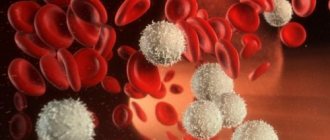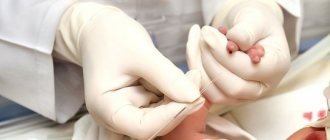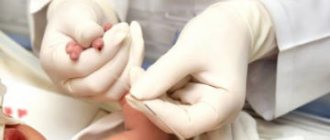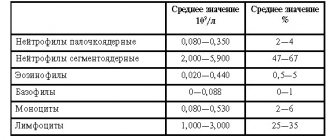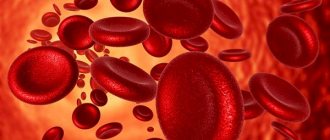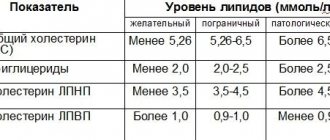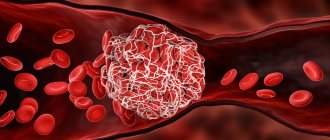Inflammatory diseases of the MPS as a cause of increased levels of leukocytes in smears
Inflammatory diseases of the genitourinary system are the main reasons for the quantitative increase in the number of leukocytes in smears.
We are talking about the participation of sexually transmitted infections, prostatitis, urolithiasis, bacterial urethritis, tuberculosis, cystitis.
Very often, the cause of prostatitis is a bacterial infection, and it always causes an increase in the level of leukocytes in smears.
With urolithiasis, there is also inflammation in the kidney tissue, in particular, and at the same time the level of leukocytes in smears increases.
Bacterial urethritis, as the name implies, is an inflammatory disease in the urethra of an infectious nature.
When they occur, the number of leukocytes in smears from the urethra increases.
Tuberculosis damage to the genitourinary organs also leads to a significant increase in the number of leukocytes in smears from the urethra.
Cystitis is an inflammatory disease of the genitourinary tract and promotes an increase in the number of leukocytes in smears from the urethra.
From anterior and total urethritis, the number of leukocytes in the smear also increases.
Increased white blood cell count
Increased formation of leukocytes occurs in the event of infection, inflammation and other negative processes in the body. That is why detecting an increased level of these cells indicates an unsatisfactory state of health.
The causes of elevated white blood cells in men (leukocytosis) can be:
- falling ill of a chronic nature;
- pathologies in the functioning of the red bone marrow, since it is here that the cells in question form and mature;
- invasion of bone marrow metastases;
- allergies (this increases the level of eosinophils);
- complete or partial removal of the spleen;
- taking certain types of medications.
An increase in the number of leukocytes is not always due to a disease. In some cases, physiological reasons can increase the level, for example:
- undernutrition or unbalanced diet;
- excessive physical activity;
- exposure to high temperatures (taking a hot bath before taking tests, visiting a bathhouse, prolonged exposure to the sun, etc.);
- severe damage to organs, skin and other tissues (cuts, burns, etc.);
- blood transfusion;
- stress, lack of sleep and other stress on the nervous system.
The exact cause of the increase in the number of leukocytes in the blood can only be determined by a doctor after additional research. There is currently no reliable information about the symptoms that accompany leukocytosis. But according to some data, general malaise, weakness, heavy breathing, and fatigue that accompany the inflammatory process are caused precisely by an increase in the level of these cells. The listed symptoms are also characteristic of ordinary fatigue and are often not paid attention to. Therefore, in order to diagnose leukocytosis in time, it is necessary to donate blood for a general analysis at least once a year, and preferably once every six months.
What additional tests need to be taken if the level of leukocytes in urethral smears is elevated?
To obtain an informative and more reliable result, the level of leukocytes in a smear from the urethra must be confirmed by tests for the content of leukocytes in the blood and urine.
In the blood of adults, normal levels of leukocytes are considered to be four and a half to eleven thousand units per milliliter.
A drop of male urine normally contains no more than three white blood cells.
According to norms, women’s urine may contain them slightly higher, up to seven pieces per drop.
If there are seven to ten of them, then this is already bad.
And more than ten are already signs of obvious inflammation.
To clarify the suspicion of signs of inflammation in the genitourinary tract, it is considered necessary to conduct a urine test according to Nechiporenko.
For him, indicators of two thousand white blood cells contained in one milliliter of urine, or rather its sediment, are considered normal.
Submission of analysis and decoding
The material for studying the number of leukocytes in the spermogram must be collected in sterile containers. Partial delivery is not allowed; the entire portion of ejaculate is required. The sample must be delivered to the laboratory within an hour. The analysis should be repeated at intervals of 2–3 weeks to monitor the patient’s dynamics, completeness and accuracy of the clinical picture.
WHO has developed standards for macro- and microscopic parameters of sperm of a healthy, fertile man.
Normal macroscopic indicators:
- ejaculate volume - above 1.5 ml;
- acidity - at least 7–8 pH;
- liquefaction time - from 15 to 60 minutes.
They also take into account the smell, which is assessed by a laboratory assistant (deviations may indicate the presence of a disease), and the viscosity of the biomaterial.
Microscopic signs include:
- concentration - 15 million/ml;
- the number of living cells is at least 50%;
- number of motile cells - at least 32%;
- the presence of normal sperm without pathologies - at least 4%;
- the norm of leukocytes in a spermogram in men, according to the table, is less than 1 million per 1 ml;
- there should be no red blood cells;
- the presence of agglutination and aggregation is a deviation from the norm.
Based on the results of the spermogram, a conclusion from embryologists is issued, taking into account deviations from the norm. The results range from normozoospermia, when all indicators are normal, to aspermia - the complete absence of ejaculate.
Effective antibiotic therapy for elevated levels of leukocytes in urethral smears
Fluoroquinolones and nitrofurans are considered effective antibiotics for the treatment of inflammatory diseases that lead to an increase in the level of leukocytes in smears.

They are also successfully treated with fosfomycin and trimethoprim.
Methods for determining the most effective antibiotics for treatment are being improved every day.
Based on these studies, conclusions are drawn about the most effective ones for each specific pathology.
The presence of pyelonephritis as the cause of an increased level of leukocytes in a smear from the urethra
With pyelonephritis, since this is an inflammatory disease, the level of leukocytes in a smear from the urethra, urine and blood also increases.
In general, with any inflammatory disease of the genitourinary organs, there may be an increase in the level of leukocytes in smears from the urethra, urine and blood.
The presence of pyuria is generally a very characteristic symptom of pyelonephritis.
A smear from the urethra may also contain not only an increased level of leukocytes, but also traces of pus.
The level of leukocytes in all liquid media with pyelonephritis increases significantly.
How do injuries to the organs of the urinary tract affect the level of leukocytes in urethral smears?
Traumatic injuries to the organs of the genitourinary system cause inflammatory reactions in them, which leads to an increase in the level of leukocytes in smears from the urethra, blood and urine.
Injuries to the MPS organs can also contribute to the occurrence of other inflammatory diseases, which also increase the level of leukocytes.
Thus, we realized that any inflammatory diseases, including those caused by sexually transmitted infections, lead to an increase in the level of leukocytes.
Treatment methods
Leukospermia is treatable, but this requires establishing the cause that led to the development of the pathology. To identify the underlying disease, the symptom of which is leukospermia, it is necessary to conduct a number of additional examinations: ultrasound of the reproductive system, sperm culture, PCR, ELISA, urethral smear, hormone test.
The following groups of drugs can be used for treatment:
- antibacterial - to treat infections;
- antiviral;
- anti-inflammatory with antioxidant action - for the treatment of pyospermia and purulent discharge;
- Dietary supplements and vitamins;
In some cases, surgery may be required, such as for varicoceles. In case of inflammatory processes, physiotherapy may be additionally prescribed, aimed at reducing the risk of relapses and complications.
Traditional medicine can be used as auxiliary agents - infusions of plantain, sage, knotweed, mumiyo. Before using these products, you should consult your doctor. Self-medication is dangerous, among other things, because a possible short-term improvement will complicate diagnosis, time will be lost, and the disease may become chronic.
If you follow the recommendations of your doctor, in most cases it is possible to normalize the leukocyte content in the spermogram.
Treatment regimens for diseases with an increase in leukocytes in the smear
The diseases listed above are all treated differently.
But antibiotic therapy or antiviral therapy is almost always needed to suppress infectious agents.
Antiseptics are widely used for local treatment of urethritis and cystitis.
They reduce inflammatory reactions and help reduce the level of leukocytes in smears, blood and urine.
Pyelonephritis is treated with antibiotics and nitrofurans, as well as all kinds of anti-inflammatory drugs.
Urolithiasis is a metabolic disease.
But when stones appear in the kidneys, infectious agents settle on them, which cause inflammatory diseases in the body.
Which doctor should you treat if you have an elevated level of leukocytes in urethral smears?
If the level of leukocytes in a smear from the urethra increases, then it is necessary to treat inflammatory diseases of the genitourinary tract by a urologist or nephrologist.

Women also need to consult a gynecologist.
If you make a timely and correct diagnosis and carry out adequate treatment, you can avoid serious complications and the level of leukocytes in the smear will return to normal.
The price and timing of treatment for inflammatory diseases depend on many factors.
They are determined not only by the diagnosis, but also by the duration of the disease, what complications it causes and the price of drugs and additional procedures.
And also the cost of treatment from the required specialist.
For example, treatment of urolithiasis comes down to frequent mechanical removal of stones from the kidneys or ureters.
Lipotripsy is performed both surgically and using, for example, a laser.
The operation itself, depending on the complexity of the stones being removed, in Moscow will cost at least forty thousand rubles.
Causes of increased leukocyte levels
Elevated leukocytes in men's spermogram may indicate the following diseases:
- sexually transmitted infections (syphilis, gonorrhea, mycoplasmosis, ureaplasmosis). If the diagnosis is confirmed, it is recommended that both partners undergo treatment. During this period, you should abstain from sexual intercourse.
- inflammatory processes in the prostate;
- genitourinary diseases such as cystitis, vesiculitis, urethritis;
- pathologies of the scrotum and testicles.
Infectious diseases underlie 15% of male infertility. Leukospermia caused by chronic diseases is the most difficult to correct.
The pathological condition can also arise as a result of bad habits and prolonged abstinence from intimacy, causing sperm stagnation.
Prevention of inflammatory diseases of the urethra and other organs of the bladder
Prevention of inflammatory diseases of the genitourinary system consists, first of all, in eliminating or minimizing the possibility of contracting infectious diseases, including STIs, using condoms.

It is necessary to prevent overheating, hypothermia and the like.
You should also avoid drafts and adverse weather influences whenever possible.
Anything that helps reduce the body’s immune defense mechanisms increases the risk of getting inflammatory diseases of the genitourinary system.
Indicators and standards
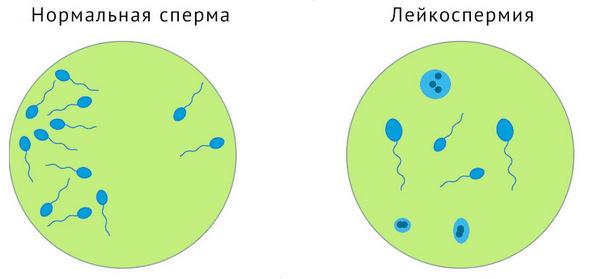
A slight excess of the norm of leukocytes in the spermogram (up to 10–15 pieces per field of view) can be caused by hypothermia, fatigue, alcohol intoxication, and stress. To minimize the likelihood of receiving false indicators, it is recommended to take a spermogram in a calm state, without signs of illness, including colds. Doctors recommend conducting the study after a weekend or vacation. It is advisable to avoid heavy exercise during this period, but at the same time do not neglect moderate physical activity, normalize nutrition and sleep.
What tests should a sexual partner take if there is an increased level of leukocytes in urethral smears?
If an STD is detected, then the sexual partner needs to do the necessary testing to detect such an infection.
First of all, for very contagious infections - Trichomonas, gonococcus and mycoplasma.
They are often asymptomatic and the sexual partner may not even know that they are sick.
Testing for the presence of these infections must be carried out using the PCR method.
No earlier than three months after unprotected sex, it is necessary to donate blood for the presence of HIV infection, treponema pallidum and hepatitis B and C viruses.
Other sexually transmitted infections are not all classified as STIs and tests for their presence are not necessary.
It is advisable to repeat the HIV test six months after unprotected sex.
Since three months after unprotected sex, there may still be no specific antibodies.

